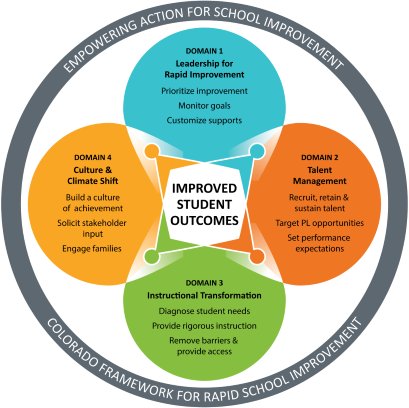You are here
Four Domains for Rapid School Improvement
Overview
The Colorado Four Domains of Rapid School Improvement is a research proven framework to facilitate rapid improvement in schools by creating domains and practices that apply across the system of a state education agency, district, and school. Within the framework, four domains are outlined: Leadership for Rapid Improvement, Talent Management, Instructional Transformation, and Culture and Climate Shift. For each domain, practices are defined that describe the role of the state, district, and school, providing examples of their roles in successful school improvement efforts. The framework is not intended to provide an exhaustive list of activities within each practice or even of all practices. Instead, it offers examples, considerations, and practical applications of what it takes to successfully lead systemic efforts to achieve rapid school improvement. A complete list of references for each domain and practice can be found in the report below.
Note: The Colorado’s Four Domains of Rapid School Improvement framework was adapted from the Center on School Turnaround’s (CST) Four Domains of Rapid School Improvement.
Domain 1 - Leadership for Rapid Improvement
Educational leaders at the state, district, and school levels drive initiatives to facilitate rapid, significant, and sustainable improvement for low performing schools. They make it a priority to elevate the performance of schools in improvement, and they communicate the urgent need for rapid improvement. Leaders catalyze and organize the coordinated work of the staff and other strategic partners charged with implementing efforts to rapidly improve schools, harnessing their efforts and drawing them to a shared vision of success. Leaders at all levels understand their role in ensuring rapid improvement; they develop and execute data-informed improvement plans that are customized to local needs to guide and monitor urgent, prioritized initiatives; and they accept responsibility for results.
Domain 2 - Talent Management
Rapid improvement requires competent and committed personnel at every level and in every position. Service providers, school-level leaders and teachers are a precursor to school improvement. Policies and procedures need to reflect an urgency and commitment to identify, select, place, retain, and sustain these personnel, especially teachers. At all levels, educators utilize and hone their instructional and transformational leadership to build capacity in those they supervise by continually balancing support with accountability.
Domain 3 - Instructional Transformation
Improving and sustaining equitable student learning outcomes depends on systemwide support for change in classroom instruction. Effective instructional practice, including strong standards-based, instruction, data-based planning, differentiation and individualization, culturally relevant, evidence-based pedagogical approaches, and classroom management must be identified, delivered and supported at the school, district, and broader system level. Schools cultivate and maintain an environment of both high expectations and support for all students’ academic and behavioral achievement. Leaders prioritize their time to focus on instructional transformation with a specific emphasis on prioritized student populations and meeting their unique learning needs.
Domain 4 - Culture and Climate Shift
Attaining the necessary level of commitment to achieve equitable results requires a dramatic culture shift towards both high academic and behavioral expectations. Leadership establishes and communicates the structure and opportunities for stakeholders to work together around common goals, engendering a culture of mutual respect, shared leadership, and focused attention on student and adult learning. State, district, and school leaders understand and engage families and community partners to support their children’s learning and the overall improvement efforts. A strong school community attends to the culture both inside and outside the school, gathering input from stakeholders and gauging perceptions about the school and the rapid improvement effort. A positive school climate reflects a supportive and fulfilling environment, high expectations and teaching and learning conditions that meet the needs of all students and their families.
Contact
Lauren Hesse, School Improvement Specialist
Phone: 720-737-3205
E-mail: Hesse_L@cde.state.co.us



Connect With Us





